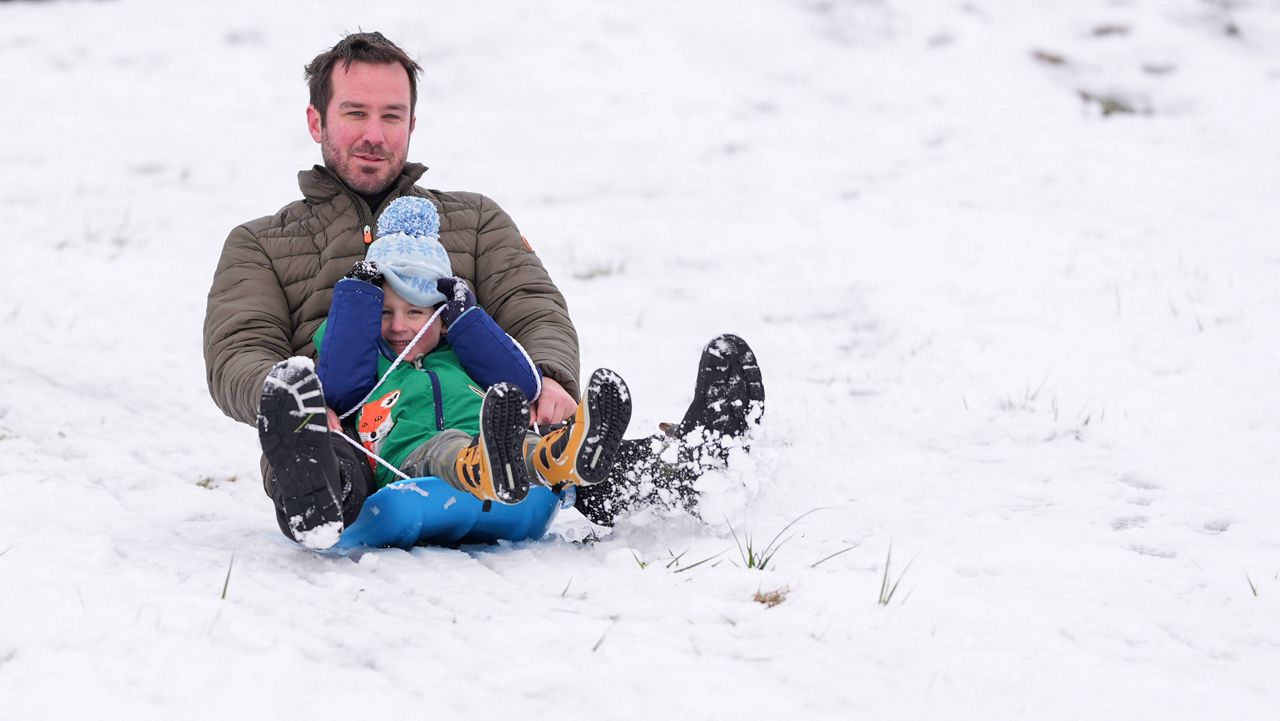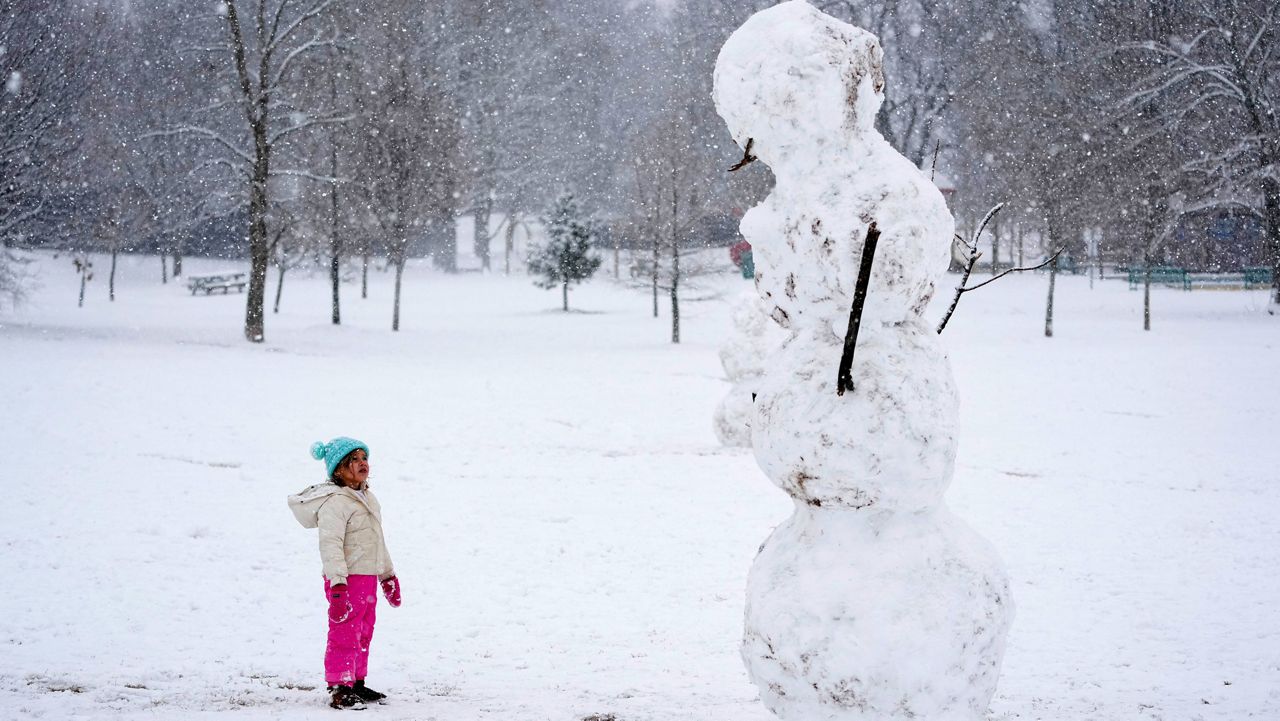ATLANTA (AP) — Flight cancellations piled up and state officials warned of continuing dangerous roads Saturday in the wake of a winter storm that closed schools and disrupted travel across parts of the southern U.S.
A storm that brought biting cold and wet snow to the South was moving out to sea off the East Coast on Saturday, leaving behind a forecast for snow showers in the Appalachian Mountains and New England. But temperatures are expected to plunge after sundown Saturday in the South, raising the risk that melting snow will refreeze, turning roadways treacherously glazed with ice.
“I definitely don’t think everything’s going to completely melt,” said Scott Carroll, a National Weather Service meteorologist in Atlanta. “Especially the secondary roads will probably still have some slush on them.”
Major roads are mostly clear, but tie-ups at affected airports remain
Major roads were mostly clear, but few ventured out early on Saturday. The Atlanta Hawks postponed the pro basketball game they were supposed to host Saturday afternoon against the Houston Rockets, citing icy conditions.
Major airports, including Atlanta and Charlotte, North Carolina, continued to report disruptions Saturday. While flights were operating, airlines canceled and delayed more flights after Friday’s weather slowed airline travel to a crawl. By noon Saturday, more than 300 flights in and out of Hartsfield-Jackson Atlanta International Airport were canceled, while nearly 500 more were delayed, according to tracking software FlightAware. More than 200 flights in and out of Charlotte were canceled, while almost 200 more ran late.
Sarah Waithera Wanyoike, who lives in the Atlanta suburb of Lilburn, was starting her second day at Atlanta’s airport on Saturday. Wanyoike arrived at the world’s busiest airport before sunrise on Friday to catch an Ethiopian Airlines flight on the way to her job in Zimbabwe.
The plane boarded after a delay on Friday, but never left, discharging passengers back to the gate after taxiing around and never taking off for six hours. Wanyoike said her luggage remained stuck on the plane and she dared not try to go home because she was told to be back at the gate before dawn on Saturday.
“People slept with their babies on the floors last night,” Wanyoike said.
But Saturday morning found the flight delayed again, and Wanyoike was deeply frustrated with a lack of communication from the airline.
“It’s not even on the board at the airport,” she said. “There’s no indication that we’re leaving.”
Delta Air Lines, the largest carrier at the Atlanta airport, said late Friday that it was “working to recover” on Saturday, saying cancellations would be worst among morning flights because of crews and airplanes that weren’t where they were supposed to be after the airline canceled 1,100 flights on Friday.
Richmond drops boil-water advisory after nearly a week
Meanwhile, the city of Richmond, Virginia, lifted its boil-water advisory late Saturday morning, nearly a week after Monday’s snow storm had cut power and caused a malfunction to the city’s water system.
Mayor Danny Avula said lab tests confirmed that Richmond’s water was safe to drink, adding that boil-water advisories had been lifted for some surrounding counties as well.
The temporary halting of the water system affected more than 200,000 people, some of whom lacked water in their homes because of diminished pressure. The state’s Legislature had also delayed the beginning of its session because of the problem.
Freezing rain pushed up electricity outages above 110,000 in Georgia on Friday night, but most power was restored Saturday. The National Weather Service reported between 0.1 inches and 0.25 inches of ice accumulation around Atlanta from the freezing rain. That wasn’t as bad as forecast. But Carroll said high winds Saturday could still pose risks where ice did stick.
“If there are any frozen branches and limbs, it’s possible that some of those can be brought down by the gusty winds during the day today,” Carroll said.
Parts of mountainous western North Carolina saw as much as 4.5 inches of snow in a 24-hour period that ended at 7 a.m. Saturday, according to the National Weather Service. And parts of middle Tennessee saw nearly 6 inches of snow by Saturday morning.
Earlier this week the storm brought heavy snow and slick roads to much of Texas and Oklahoma before moving east. Arkansas and North Carolina mobilized National Guard troops for tasks such as helping stranded motorists and governors declared states of emergency.

Alabama schools could remain closed if ice doesn’t melt off secondary roads
School was canceled on Friday for millions of children from Texas to Georgia and as far east as South Carolina, giving them a rare snow day. Officials in northern Alabama on Saturday said schools could remain closed Monday if ice doesn’t melt off secondary roads.
The storm piled up more than a year’s worth of snowfall on some cities.
As much as a foot fell in parts of Arkansas, and there were reports of nearly 10 inches in Little Rock, which averages 3.8 inches a year.
More than 7 inches fell at Memphis International Airport in Tennessee. The city usually sees 2.7 inches a year.
The storm dumped as much as 7 inches in some spots in central Oklahoma and northern Texas.
The polar vortex of ultra-cold air usually spins around the North Pole, but it sometimes ventures south into the U.S., Europe and Asia. Some experts say such events are happening more frequently, paradoxically, because of a warming world.
The cold snap coincided with rare January wildfires tearing through the Los Angeles area.



